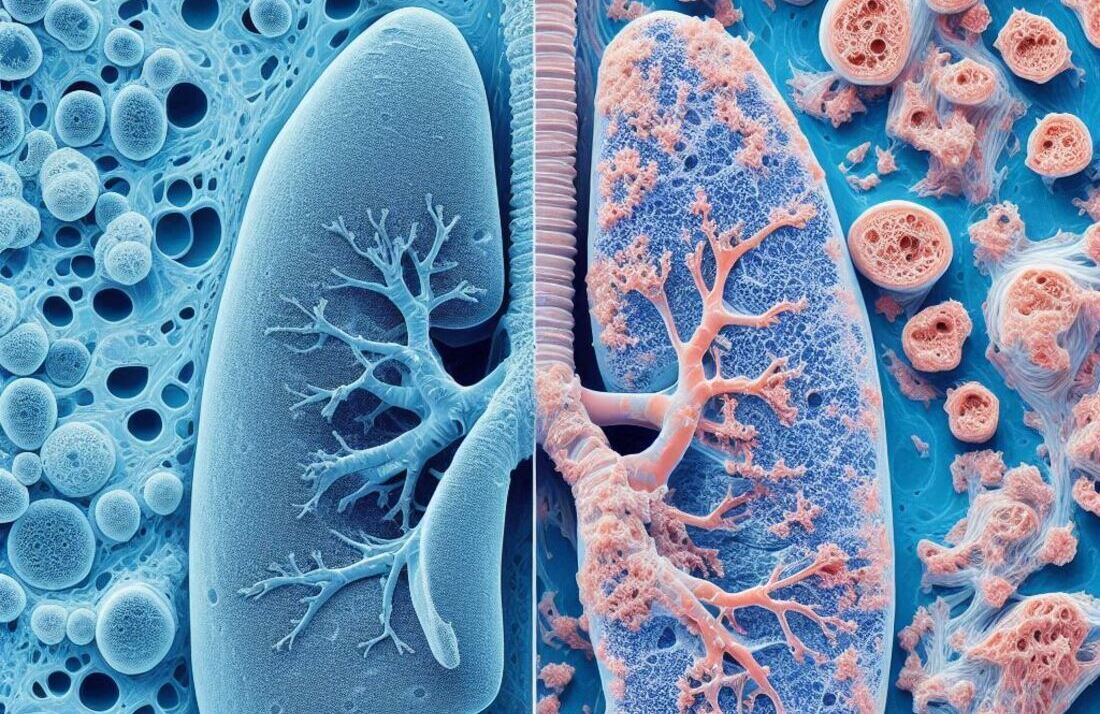Imagine taking a deep, refreshing breath, filling your lungs with clean air and feeling invigorated.
But for many people, this simple act can be a struggle.
Inflammation in the airways, often caused by factors like smoking or chronic conditions, can make breathing difficult and impact your quality of life.
The good news is, you don’t have to suffer in silence.

While medication plays a vital role in managing chronic lung conditions, incorporating natural anti-inflammatory foods into your diet can significantly improve your lung health.
These powerhouses pack nutrients that can reduce inflammation, promote healing, and optimize your lung function.
Intrigued? Read on to discover how natural anti-inflammatory foods can help you breathe easier and live a healthier life!
Understanding the Problem: Inflammation and Its Impact on Your Lungs
Inflammation is a natural response by your body’s immune system to fight off infection or injury.
However, chronic inflammation can damage healthy tissues and contribute to various health problems, including lung diseases like asthma and COPD (Chronic Obstructive Pulmonary Disease).
When your airways become inflamed, they narrow, making it harder to breathe.
This can lead to symptoms like:
- Coughing
- Wheezing
- Shortness of breath
- Chest tightness

The Culprits: Triggers of Inflammation in Your Lungs
Several factors can trigger inflammation in your lungs.
Here are some common culprits:
- Smoking: Cigarettes contain over 7,000 chemicals, many of which irritate and inflame the airways.
- Air pollution: Airborne pollutants, like smog and dust, can irritate and inflame your lungs.
- Allergies: Exposure to allergens like pollen or dust mites can trigger an inflammatory response in your airways.
- Diet: A diet high in processed foods, unhealthy fats, and added sugar can promote inflammation throughout the body, including your lungs.
The Power of Food: How Anti-inflammatory Foods Can Help
Certain foods are packed with nutrients that can help combat inflammation and promote lung health.
These nutrients include:
- Antioxidants: These powerful molecules fight free radicals, which can damage cells and contribute to inflammation.
- Omega-3 fatty acids: These healthy fats have anti-inflammatory properties and may help reduce airway inflammation.
- Vitamins and minerals: Vitamins A, C, and E, along with minerals like magnesium and zinc, play a crucial role in lung function and reducing inflammation.
Natural Anti-Inflammatory Food Powerhouse: Top Choices for Lung Health
Now, let’s dive into the delicious world of anti-inflammatory foods that can benefit your lungs!
Here’s a table outlining some top choices, their key nutrients, and potential benefits for lung health:
| Food Group | Examples | Key Nutrients | Potential Benefits for Lung Health |
|---|---|---|---|
| Leafy Green Vegetables | Kale, spinach, collard greens | Vitamins A, C, K, antioxidants | Reduce airway inflammation, improve lung function |
| Fatty Fish | Salmon, sardines, mackerel | Omega-3 fatty acids, Vitamin D | Reduce inflammation, improve lung function in people with asthma |
| Fruits | Berries (blueberries, strawberries), cherries, oranges | Antioxidants, Vitamin C | Reduce inflammation, protect lung tissue from damage |
| Whole Grains | Brown rice, quinoa, oats | Fiber, antioxidants | Reduce inflammation, improve overall health and lung function |
| Nuts & Seeds | Walnuts, almonds, flaxseeds | Omega-3 fatty acids, Vitamin E, fiber | Reduce inflammation, improve lung function |
| Tomatoes | Tomatoes, tomato sauce | Lycopene, Vitamin C | Reduce inflammation, improve airway health |
| Olive Oil | Extra virgin olive oil | Monounsaturated fats, antioxidants | Reduce inflammation, improve lung function |

Key Takeaways
- Chronic inflammation in the airways can make breathing difficult and contribute to lung diseases.
- Incorporating natural anti-inflammatory foods into your diet can help reduce inflammation, promote healing, and optimize lung function.
- Leafy green vegetables, fatty fish, fruits, whole grains, nuts & seeds, tomatoes, and olive oil are excellent choices for lung health.
Beyond the Plate: Additional Tips for Healthy Lungs
While a diet rich in anti-inflammatory foods is a powerful tool, it’s important to consider a holistic approach to lung health.
Here are some additional tips:
- Manage stress: Stress can worsen inflammation. Practice relaxation techniques like yoga or meditation.
- Exercise regularly: Regular physical activity strengthens your lungs and improves overall health.
- Maintain a healthy weight: Obesity can increase inflammation and worsen lung function.
- Avoid smoking and secondhand smoke: Smoking is the leading cause of lung disease.
Frequently Asked Questions (FAQs) on Anti-inflammatory Foods and Lung Health
Q: Does this mean all processed foods are bad for my lungs?
A: Not necessarily. However, many processed foods are high in unhealthy fats, added sugar, and refined carbohydrates, all of which can contribute to inflammation. It’s best to limit processed foods and focus on whole, unprocessed options like fruits, vegetables, whole grains, and lean proteins.
Q: Are there any supplements I can take to improve my lung health?
A: While a healthy diet is crucial, certain supplements may offer additional benefits. Consult your doctor before taking any supplements. They can advise you on options like:
- Fish oil: Rich in omega-3 fatty acids, which can reduce inflammation.
- Vitamin D: Deficiency is linked to increased risk of respiratory infections.
- N-acetylcysteine (NAC): May help improve lung function in people with COPD.
Q: I have a chronic lung condition. Can these foods still help?
A: Absolutely! A diet rich in anti-inflammatory foods can complement your existing treatment plan and contribute to overall lung health. However, always prioritize your doctor’s recommendations and consult them before making any significant dietary changes.
Building a Lung-Healthy Diet: Sample Meal Plan

Breakfast:
- Oatmeal with berries and walnuts (whole grains, antioxidants, omega-3 fatty acids)
- Green tea (antioxidants)
Lunch:
- Grilled salmon with roasted vegetables and brown rice (fatty fish, vitamins, fiber)
- Side salad with olive oil dressing (leafy greens, healthy fats)
Dinner:
- Chicken stir-fry with broccoli, peppers, and quinoa (lean protein, vegetables, whole grains)
Snacks:
- Apple slices with almond butter (fruits, healthy fats)
- Handful of mixed nuts (omega-3 fatty acids, vitamin E)
Remember: This is just a sample, and you can personalize it based on your preferences and dietary needs.
The Road to Healthy Lungs: It’s a Journey, Not a Destination

Taking care of your lungs is an investment in your overall health and well-being.
By incorporating anti-inflammatory foods into your diet, managing stress, exercising regularly, and avoiding smoking, you can take control of your lung health and breathe easier.
Remember, consistency is key.
Make healthy choices a part of your daily routine and enjoy the journey towards a healthier, more vibrant life.
Call to Action
- Share this blog with friends and family who might benefit from learning about anti-inflammatory foods and lung health.
- Leave a comment below and tell us about your favorite lung-healthy recipes!
- Talk to your doctor about creating a personalized plan to optimize your lung health.
Citations
- American Lung Association: https://www.lung.org/
- National Institutes of Health (NIH): Natural Anti-Inflammatory Foods For Healthy Lungs
Disclaimer:
The information in this blog is for educational purposes only and should not be construed as medical advice. Always consult with a healthcare professional for personalized guidance on improving your lung health.



